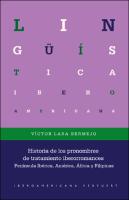Historia de los pronombres de tratamiento iberorromances
Península Ibérica, América, África y Filipinas
Abstract
Address pronouns in the Ibero-Romance spectrum are one of the most complex phenomena that have historically occurred in these languages, especially in Spanish and Portuguese. In this book, the diachrony of politeness and treatment pronouns is explained from a global perspective that allows us to understand the reasons that have led to such complexity and the enormous current variation. Thus, not only the geolinguistic, sociolinguistic, historical and pragmatic relationships are established, but also the grammatical determinants that are behind the familiar familiarity, voseo, ustedeo, subercedeo, voceamento and tuteamento are argued, and their multiple concordances, also taking into account the contact language and migration processes. Thanks to this monograph, we will be able to understand why there are different areas in the Iberian Peninsula and Latin America, and what journey Africa and the Philippines have experienced in terms of their treatment pronouns
Keywords
diachrony of courtesy; migratory processes; tuteo; voseo; submercedeoDOI
10.31819/9783968693316ISBN
9788491922988, 9783968693309, 9783968693316Publisher
Iberoamericana VervuertPublisher website
https://www.iberoamericana-vervuert.es/Publication date and place
2022Series
Lingüística Iberoamericana, 92Classification
Linguistics


 Download
Download Web Shop
Web Shop